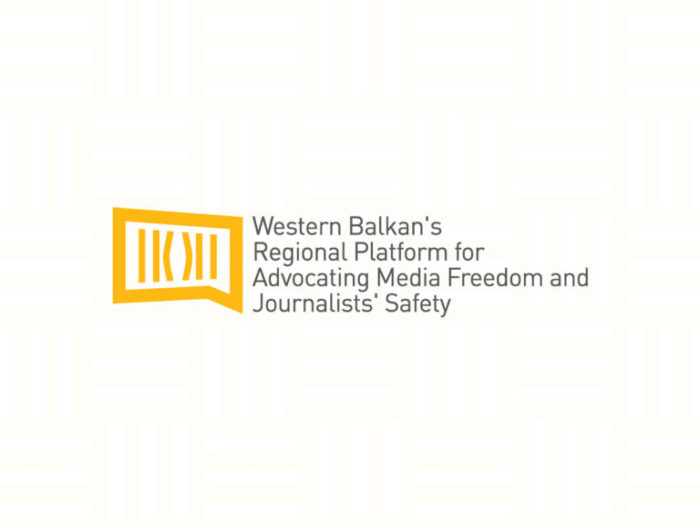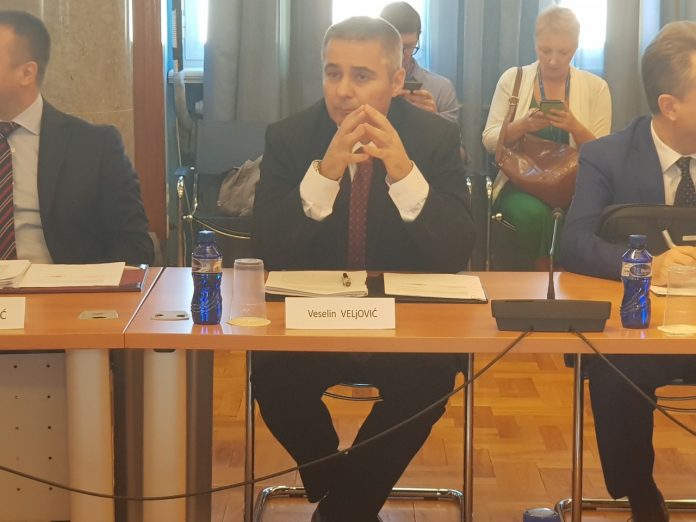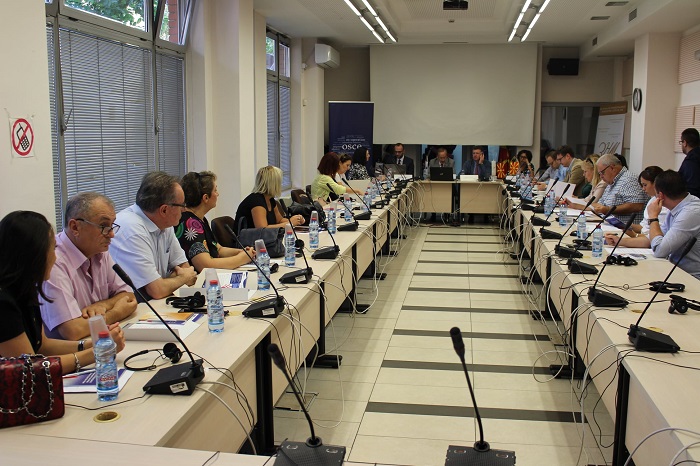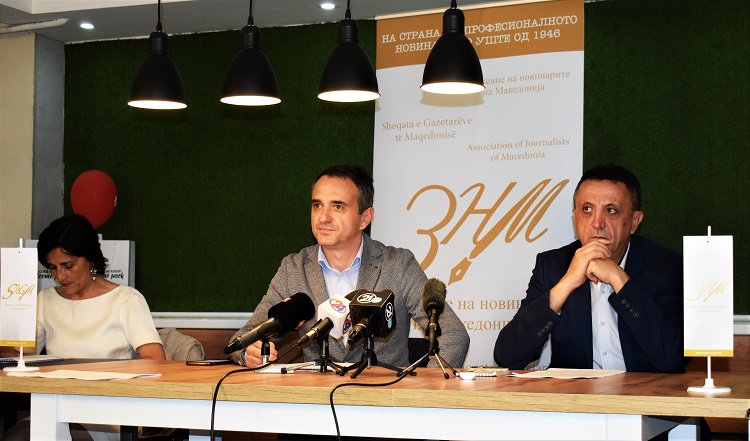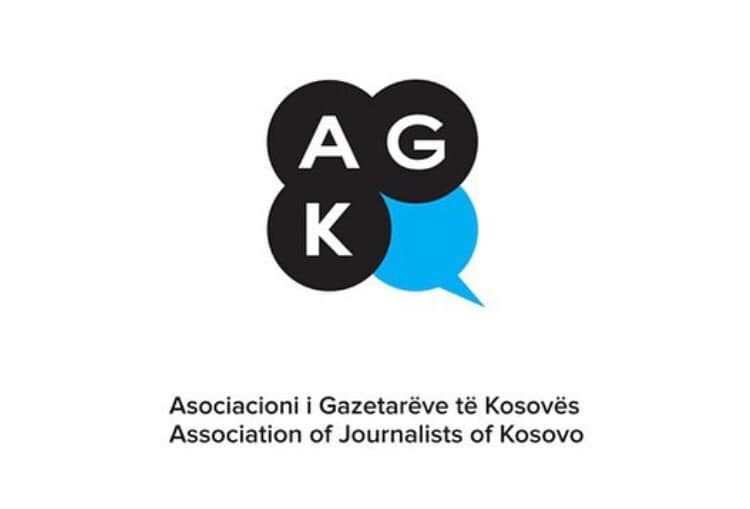By: Sandra Gojkovic-Arbutina
Sarajevo, 16.09.2019. – When, at some point in your life, you decide that journalism will be, not only your profession, but also a lifetime commitment, much more than a job, something you lie down and get up with, together with all the passion and good that journalism brings, you also accept all those menaces and hazards that inevitably follow. But, what you certainly do not accept is that those hazards should be your everyday life, routine that comes together with job description, or in other words, occur without consequences and epilogue.
Prejudice and discrimination based on gender, sexual and similar grounds are not common only for media, similar modus operandi is seen in other branches, so it’s not unusual for female journalists to be scrutinized on several horrifying basis – whether she was brought by someone, or advanced due to her physical appearance, whether she could be entrusted with serious assignments and managerial roles because she is pregnant / planning family / happy – unhappy in love, if she openly and unreservedly exposes her opinion, then she has “male brain’, if she doesn’t complain about long working hours then her private life is certainly blunt and dull – so, possibilities for undermining are endless.
Statistically speaking, female journalists outnumber their male colleagues in all media in Bosnia and Herzegovina, so it is certainly an indicator that female journalist are responsible, determined, reliable, hardworking, perceptive, flexible and not so brittle and weak to seek an escape into the safety of less stressful occupations.
Romanticizing journalism as the profession, as well as a delusion on Don Quixotesque fight against windmills, is a kind of trap that leads to the other extreme, not to say, a lie – it is just a pursuit to do your job in the best possible way, but as long as our mind and hart serve us, our main priority remains creating conditions for unobstructed, relaxed work (it would be ambitious to say liberated) deprived of political, economic, racial, sexual – the whole range of pressures.
This topic is persistent within our guild and association, because it is, obviously, our biggest burden we want, but can’t deal with because it is a result of widespread moral, cultural, social, human and any other demise of this society, we are drawn even deeper into the mud, we are reduced to scribblers who should be beaten (some studies show) because female journalists write what they want they do not deserve respect, which is in this post-war society reserved only for political elite and those who rely on their political parties.
When we are talking about the status and fight of female journalists it is more then important to emphasize that they are victims of so called Balkan folklore that says that they, neither genetically nor culturally, are not predestined for responsible jobs, managerial positions that carry the difficult decisions but also a lot of unpleasant situations, where they relent under the pressure.
On the other hand, it is more then important to repeat again and again that such cases, although numerous, can not be accepted as a rule or matrix and blindly be followed. Also, those voices that speak of women as successful, hardworking and dedicated journalists should not be ignored nor minimized. On the contrary.
Sinisa Vukelic, editor-in-chief of Capital.ba and president of the Banja Luka Journalists’ Club, during 14-year-long existence of this respectable, economic portal, mostly worked and cooperated with female journalists. He says that, although a coincidence, it has proved to be a good decision.
“My whole newsroom is female, and it’s been that way for 14 years since the establishment of Capital. It is not something that was done intentionally, but simply happened that way”, says Vukelic.
Vukelic notices that attacks and threats against his journalists (and there were many) bear no gender signs or marks, so that is why, regardless of gender, there is no legal protection, nor an adequate response.
For years, Banja Luka Journalists’ Club has been asking for a clause in Criminal Code of Republic of Srpska that certainly would discourage future perpetrators of attacks on journalists. Namely, journalists want all attacks against media workers to be treated as an attack on official person, so penalties would be higher and judical processes would be more efficient. Regarding Criminal Code of RS, Article 388, Paragraph 1 says:
(1) Whoever attacks or seriously threatens to attack an official person or a person assisting an official in the execution of his duties, shall be punished by imprisonment for a term not exceeding three years.
(2) If the perpetrator in the course of the commission of the offence referred to in Paragraph 1 of this Article inflicted a bodily injury upon the official person or upon his assistant, or if the perpetrator abuses him or threatens to use a weapon, the perpetrator shall be punished by imprisonment for a term between three months and three years.
Although there are no guarantees, such legal penalties would stop any future attacks (and there will be some, for sure) because those penalties are far more serious than penalties in the case of an attack against an „ordinary” citizen.
It is important to emphasize, mostly due to certain misconceptions and misinterpretation in the public, media community has never requested to declare journalists as an official persons – because, of course, there are no legal possibilities for that.
We simply want those attacks to be treated as if they were attacks on official persons in order to minimize any future intention to physically assault or harass female and male journalists, not to mention murder attempts.
Regrettably, such initiatives got nothing more then declarative support “we understand, we support, but it’s not possible”. However, in the case of attempted murder of Vladimir Kovacevic, journalist of BN TV and Gerila.info (one of the worst cases of attacks on journalists), it seemed that deputies of National Assembly of the Republic of Srpska were ready to support such an initiative promptly, but it was mostly due to media pressure as well as their shock because of the seriousness of this attack. Kovačević has survived primarily due to his physical fitness and sanity.
Boxer Marko Colic, one of the attackers was sentenced to four years, while the second attacker is still on the run. But, what is the crucial for such processes is to find who is behind this crime, who ordered it. But, still, there are no answers.
Media and public pressure, local as well as regional, brought this process at least to some point, but the one who ordered this attack and paid for it is still at large. He is probably waiting to finally settle all the hassle, so he could continue with his activities.
It seems that, precisely at this point, when you need to bring such case to an end so we could talk about democratic, free, constitutional state – everything stops.
Milkica Milojevic, a longtime journalist and activist, says that it would be illusory in such restrained society to expect any kind of institutional protection for those who dare to review such a system and fight against corruption, crime, political violence and irresponsibility. Interestingly, according to Milojevic, generally there are no problems with the police, on the contrary. Those attacks are usually fairly investigated, at least at this, basic level. However, when it comes to justice, problems occur.
“Even the case is processed, they only sentence perpetrators, of course, only if they are not politically powerful or directly connected to powerfull people. But, the investigation never or rarely comes to those who ordered it. A particular problem is political responsibility or, better to say, irresponsibility. Politicians are the ones who promote and standardize attacks on journalists. In this country, things will change when, for example, Milorad Dodik publicly apologize for brutally insulted Gordana Katana and Ljiljana Kovacevic. Or, better yet, things will change significantly when Milorad Dodik and other leaders stop to behave in such a way, because they need to know that abusing journalists means the loss of votes in the elections”, says Milojevic.
Milojevic says that the initial address, in a case of an attack, is certainly the police, but also the media company where journalist works, journalists’ associations – all those who may, in some or other way, contribute to overcome the situation and get an epilogue.
“First of all, we have to believe that all citizens are equal before the law, except politicians who, according to european conventions, have a greater responsibility than the so-called ordinary citizens, especially political strongmen. Also, we have to publicly urge lawyers to pro bono advise journalists in such cases, because this is important for free and democratic society as well as the rule of law”, says Milojevic.
No attack should be unreported because it is the way female journalists would prove that they are brave to confront anyone, would prove that they have the right to carry out public job and that the age when a woman’s place was (only) in the kitchen has passed a long time ago.
Gordana Katana, also a longtime journalist and activist, works as a correspondent in Oslobođenje. She was often the target of verbal attacks, She thinks that system in our country absolutely does not recognize the protection of female journalists.
“That is why, anyone who thinks that we, female journalists, are not working the way someone thinks we should, they have right to attack us. I have never been against constructive criticism, never thought that everyone should agree with the way I work, or to agree with the editorial policy of my media house. Criticism based on dialogue and arguments is one thing, but offense, calls for lynching, and even physical attacks are something else. Also, attackers are rarely publicly condemned”, says Katana.
She adds that the most worrisome is the fact that when you’re exposed to the harshest insults, there are still those who think that you have deserved it, because of the editorial policy of your papers.
“It would be collegial, human to support the person who is under attack, but again, it is something that rarely happens. Why is that so, I honestly do not know. Whether it is due to fear from politicians, because they are the most aggressive, or perhaps fear from the editor, but the silence is the only thing we’re witnessing. It is something I have been through whole my career”, says Katana who barely remembers different situations.
She says that no one can forbid genuine, female solidarity. Journalists are brave to stand behind their attacked colleague only on social networks, but fail to do it when attacks happens. Milojevic says that support is mostly declarative, but hard to judge whether that support is sincere or not. But, nothing has changed for more then ten years, recalls Milojevic.
“However, we have protested on several occasions against attacks on our colleagues. Also, BH journalists provided a concrete legal aid in such cases through its helpline. Of course, it’s not enough, we should be an avant-garde of professional courage and solidarity”, says Milojevic.
She thinks that solidarity could be seen at its “micro level” – what we have done for our attacked colleague or what editors and directors have done for their journalists, opposing political figures or large advertisers.
“We live in a society where civil and professional courage is something very rare. Of course, this is our profession, we’re not excused from liability, but, for example, look at medical profession. How many doctors publicly stood up against their Chamber. That Chamber in many cases hasn’t revoked licenses for doctors sentenced for death of their patients or serious damage to their health. I haven’t heard for any such case”, Milojevic concluded.
It is crucial for jorunalists, who fight for their rights, to have strong support of its media company – which is not the case in many occasions. They are left out there in the windswept, in totally uneven battle with political strongmen.
Media company, with all its resources, especially the legal department, reperesents strong defense mechanism, but also they send an important message that they stood behind all that is published, broadcasted or written. They should especially protect its female journalists.
But before you even get into the whole story, journalists need to know as much as possible about their rights, to carefully study all possible ways to protect themselves in the field of labor and social rights. But, it is not the case in practice. Many of those who have been subjected to any kind of torture were aware of their rights, but couldn’t fight off those attacks and suffered discrimination for years. In many cases, those journalists thought there was no one in the chain or the system to protect them adequately.
The Female Journalists Network in BiH was established last year. Among other things, the aim of this network is to educate, guide, assist and support every aspect of journalist’s fight on any grounds. It has proved to be very important in a situation where you feel lonely in the chaotic situtation.
Kristina Ljevak, acting director of TV Sarajevo Canton, who has been subjected to lynching after her appointment, says that strong support she had was not only support for her personally, but also a voice against 30 years old machinery.
“I am grateful to my colleagues because their support means that we are not all the same, but also, that there are still of people whose honor is not marketed. I want to stress, I have received support not only from my colleagues, but also other people who felt the need to support me. Some of them offered services, free legal services, but it has not come to justice yet. I shall deal with justice after I take a break from injustice”, says Ljevak.
“I have always been active in the world of culture and LGBT activism”, says Ljevak.
No one seemed to be bothered by her activism because culture was on the sidelines of society”. Her name has never been the subject of any discussion. But, everything changed after her appointment, because her position was seen as a powerfull position. Some people felt endangered.
When the whole horror happened, she had realized the importance of the support, especially support of principled people in this business. It would be much more difficult without that support. She realized the importance of professional and responsible decisions.
“When your professional biography is clean, unspoiled, then you probably have done right thing, because they can’t find anything against you”, says Ljevak.
It was an agony, because she didn’t know who has it all started, what’s next. Or how far they were ready to go. She says that psychotherapy is one of the ways to deal with it, but also to surround itself with good people, no matter private or professional environment.
“It is a great luck that my professional and personal happiness is not dependant on my position. It is easier to endure pressure that way. Of course the hardest thing was to handle allegations regarding the broadcast of the film (especially those who hasn’t watched the film) and to handle allegations about denying genocide. This example reminds us of sad fact that people who survived the tragedy believe they have every right to influence the decisions of professionals, no matter the profession. I won’t comment religious communities at all”, said Ljevak.
Appointed at the end of May, Ljevak in her interview for Klix.ba in the July (when lynching was at its peak), demonstrated the best way how to deal with the inevitable pressures of the job. She continued with her professional commitments even stronger.
“In a case that journalistic authority said I was bad journalist, I would mind. But when it comes from Fascist underworld, I really don’t care. I’m reffering to my comments on behalf of LGBT activism. It hurts me, like every human being, because of my family. Since religion was their only argument, I guess that the one they believe in, would judged them objectively. For me there are only earthly courts, and according to the court of my profession, I am competent person to perform these duties”, said Kristina.
She spoke about future generations of journalists who will inevitably endure some kind of lynching, torture and pressures.
“Professional integrity is perhaps the most difficult to achieve, but it is the best and irreplaceable shield”, says Ljevak.


